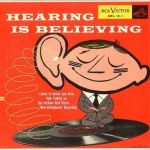He writes:
Quite happy for you to promote your business Tom, but surely you are a better person than doing it in this way. I know that other people in the industry have said unkind things about you but you can rise above these insults.
I never say that the people making these modern records, as well as those reviewing them, are malicious or evil. I say they make or review bad sounding records and are simply misguided and incompetent.
Am I being unkind? If Michael Bay makes one bad movie after another, are we unkind to point that out? I don’t know whether or not he is a bad person, but I do know that he is a bad filmmaker, and gets called out regularly for putting out a bad product.
Everyone understands that this is a matter of taste. If you always wished The Beatles albums had more bass, more compression and a smoother tonal balance overall, you can buy the new Heavy Vinyl pressings and get the sound you prefer on every title The Beatles ever released.
That sound does not exist on the tapes.
I have no way of actually knowing that for a fact, but since no mastering engineer before 2014 had ever put that sound on an actual record, I think we can safely say that the evidence supports the idea that a completely “new sound” was specifically created for The Beatles when their catalog was remastered this century. [1]
Call it The New Beatles Sound. I am on record as not liking engineers who create a new sound for records that had perfectly good sound already. Those of us who do not like our Beatles album to have those qualities should not be buying these newly remastered versions.
We offer the consumer an alternative sound, and, since our Beatles Hot Stampers are far and away our best sellers, it seems our customers agree with us that they actually do sound better. Some come back, sure, but not many, and I don’t think anyone has ever said they liked the new pressings better, although that possibility exists.
In some ways we operate like Consumer Reports. Blender X is terrible at making margaritas and blender Y is good at making them. The company that makes bad blenders should be called to account. If there is a name attached to that company, then I guess we can say that that person who runs that company should learn how to make better blenders or find something else to do with his time.
I am not impressed with the quality of the records being made today, and it follows that those who make them are responsible for the poor quality of the modern remastered LPs they make.
Is there a kind way to say that Pete Hutchison of The Electric Recording Company makes some of the worst sounding records I have ever played in my life? Should I pretend he doesn’t? If you play me one of his awful records, and don’t tell me who made it, I can judge the record on its merits, the way we judge all records. We test records blindly for precisely this reason. We let the record tell us how well it was made, what it does right and wrong relative to other pressings of the same album, apples to apples.
His records tell me he loves the sound of the murkiest, muddiest vintage tube equipment ever made, and wants every record he makes to have that sound.
In my book that is an egregious case of My-Fi, not Hi-Fi. We wrote about it here.
Is there a kinder way to point that out? It’s astonishing to me that anyone takes this guy seriously. This is the sound audiophiles want?
Here’s a question for those who defend this man’s approach to mastering.
Did Bernie Grundman make all his records sound the same?
Did he layer some kind of sonic signature over the top of everything he did?
Does Aja sound like Blue sound like Heart Like a Wheel sound like Thriller sound like Tapestry?
On my stereo they sure don’t. I built a stereo to get out of the way of the records I play, and it lets all these records sound markedly different from one another.
But Hutchison takes exactly the opposite approach. He wants the same heavy tube sound on every record he makes. Is it mean to point that out?
Bernie Grundman has mastered many of my favorite recordings of all time. Doug Sax actually mastered both of my two favorite recordings of all time, Ambrosia’s first album on vinyl and Jellyfish’s Spilt Milk on CD.
But when these superbly talented engineers master bad sounding audiophile pressings for the likes of Chad Kassem and others, who deserves the blame?
Maybe Kassem told them what sound he wanted and they gave it to him. That’s their job, to deliver a product that the customer will pay for. The customer here is Chad, not the audiophile consumer.
Chad apparently likes the sound of the records he produces. I do not and I make an effort to describe precisely the sound I find objectionable on his pressings. My reviews of both of his Tea for the Tillerman releases (the 33 and the 45) go on for days. I recommend you check them out if you want to know more about the failings of his albums in detail.
Opinion? Mere subjectivity? We back up everything we say about our offerings with an actual physical record that you can buy, risk free, to demonstrate the superiority of a properly mastered, properly pressed LP, one we cleaned, auditioned and stand behind 100%.
Some of the very same engineers I criticize made the record I might sell you. Lots of TMLs and BGs can be found in the dead wax of our Hot Stamper pressings.
Why wouldn’t they be found there? They are often found — after the fact, mind you — on the best sounding pressings of the albums we play in our shootouts.
These vintage pressings seem to have very little in common with the work these men are doing now.
Is there a kinder, gentler way to point that out? Should I just shut the hell up about it?
I guess we could say the companies producing records today mean well. They produce a product at a price for the market they are trying to reach. Chad thinks he can get $150 for his records and therefore he prices them at $150. They used to sell for less, now they sell for more. That’s how markets work. We do the same.
The records Chad and his competitors make are suitable, in my opinion, for those who set lower standards, or don’t know any better, or have modest systems, or just aren’t very serious about records and audio. Fine by me. It’s no skin off our noses.
We mostly appeal to a different group. A group that typically has heard those Heavy Vinyl pressings and wants something better. Something with zero collector value, but 100% top quality music and sound value.
Is it unkind to say we set higher standards and price our products accordingly?
Are we implying that these Heavy Vinyl labels set lower standards and price their records accordingly. Yes, we are.
All we are doing is pointing this out, using, I freely admit, stronger language than some might like. I have always favored plain speaking over the kind of bush beating, special pleading and excuse making so many audiophiles and those who write for them seem to prefer.
If your feelings are easily hurt, I am definitely not the guy you should be reading. I find bad sounding records infuriating and I am not averse to saying so. Best to avoid my blog if you don’t like reading somebody who gets pissed off and feels ripped off every time he drops a needle on one of these lousy remasters.
We write passionately about good records — the ones we sell — but there is really no need to read what we say about our records either. They speak for themselves, and we believe — based on the evidence — that they deliver on their promises.
Try some, compare them with what you own and see if you still feel kindly toward the modern pressings you’ve no doubt been buying. There is a good chance you might not feel so kindly, once you can clearly hear what is missing from them.
And if not, no harm done, return shipping is on us, and a full refund will be posted to your card.
To paraphrase the great one, if you never hear one of our Hot Stamper pressings, most likely you go your way and I’ll go mine.
But if you do hear one, and you do like it, the milk of human kindness you had shown these modern record makers may turn as sour in your mouth as it has in mine.
TP
[1] The original UK Beatles albums that I have played, for the most part, lacked top end extension, were crude, congested and opaque, but often had lots of Tubey Magic in the midrange, with one exception. This is what the mastering engineers and mastering equipment of those days managed to do with the master tapes.
Later, in the ’70s, with better mastering equipment, pressings with none of those problems were produced. This tells me the master tapes were very different sounding than the original vinyl pressings would lead one to believe.
The records that sound more like live music are the ones I want to play, and some of those were made in the late ’60s, the great bulk of them were made in ’70s, possibly some in the ’80s and ’90s, and none to my knowledge were made in any decade to follow.
He’s a mastering engineer in the same sense that a person who makes mud pies is a piemaker.
I have not played any of his classical albums. I have in fact only played one title, a jazz record I happen to know well, and his remastered version is no better than the other records that get an F grade for sound and currently are to be found in our bad sounding audiophile records section.
I will publish a review one of these days, but until then, I recommend you steer well clear of this man’s records.
An extract from Steven Novella’s explanation of this psychological effect gives some background:


 More on The Firebird
More on The Firebird

 Finding Hot Stampers is all about doing shootouts for as many different pressings of the same title as you can get your hands on.
Finding Hot Stampers is all about doing shootouts for as many different pressings of the same title as you can get your hands on.


 The Mud Pie Maker Himself
The Mud Pie Maker Himself